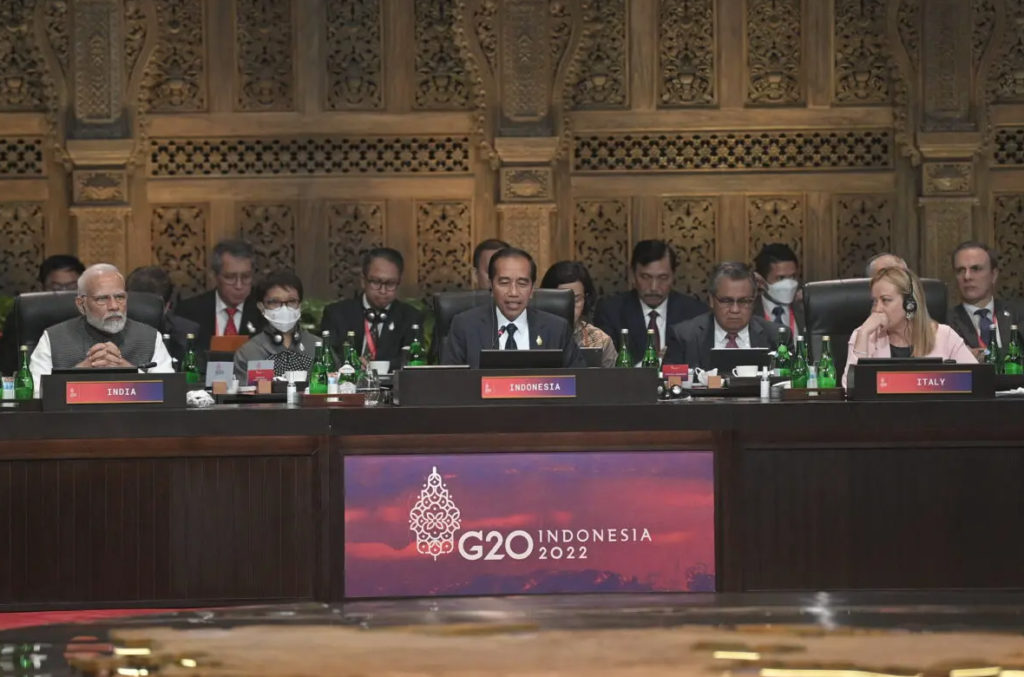The G20 summit in Bali ended overnight
(sustainabilityenvironment.com) – Given the tensions over the war in Ukraine and the way the thematic summits and preparatory meetings went, it is perhaps already an unexpected result that the G20 in Bali managed to produce a joint final declaration. Where moreover “most” of the countries “strongly condemn” the “war” in Ukraine. This formulation was not opposed by Russia, represented by Foreign Minister Sergei Lavrov. And it is, perhaps, a not-so-obvious result that the final communiqué of the two days in Indonesia explicitly mentions the goal of 1.5 degrees. The G20 Climate, at the end of August, had made a resounding flop. Closing the works only with a “summary of the presidency” but no commitment. The fact is that the Indonesian G20 Presidency wasted a crucial year in accelerating the fight against the climate crisis by a group of countries representing 75% of global emissions.
What the G20 Bali final communiqué says about climate
One of the most successful results of last year’s G20 Climate Summit in Italy was the inclusion of a clear reference to the more ambitious goal of the Paris agreement. This reference was then transferred to the final decision of the COP26 in Glasgow. Last night, after many uncertainties, the G20 in Bali maintained the reference. Without making any progress compared to 12 months ago.
If you compare the Bali Communiqué and the Rome Communiqué of 2021, the passage (point 13) remains substantially identical with this only addition: “we decide to pursue efforts to limit the increase in temperature to 1.5 ºC”. The rest is an almost identical copy of the Rome version: “We recognize that the impacts of climate change at 1.5 °C are much lower than at 2°C. Keeping 1.5 ° C at hand will require significant and effective action and commitment from all countries, taking into account different approaches, Through the development of clear national paths that align long-term ambition with short- and medium-term goals, and with international cooperation and support”.
A good result for the G20 in Bali would have been to take back what was removed from the Rome communiqué diluting its ambition and credibility. That is, the reference – present in the first draft, then whitened – to the need to “take immediate action to keep 1.5 degrees at hand”. But continuing to repeat “meaningful and effective actions” does not – once again – ensure that the G20 countries accelerate climate action in this crucial decade.
Climate finance and energy: still zero ambition
The other chapters related to the climate crisis also do not go beyond the text already consolidated last year or the commitments made in the meantime in other international fora. On climate finance, the G20 in Bali reiterates the commitment of the “developed countries” to provide $ 100 billion until 2025, as well as reiterates the intention to double the funds for adaptation to the level of 2019. One point, the latter, is already included in the Glasgow climate pact.
It also repeats another point established at COP26, namely the commitment to update as soon as possible the NDCs, namely the voluntary national contributions, to align them to the 1.5 of C. Then there is an appeal to the “parties” engaged in COP27 to “urgently increase ambition on mitigation and adaptation” and to “make progress on losses and damages“. But from Bali nothing more than an invitation comes to Sharm el-Sheikh.
In the energy chapter, the G20 in Bali resumes the 2021 version on coal but with one important difference. This time the 20 countries are committed to “accelerate efforts” for a reduction (phasedown) not for the elimination (phase out) of this fossil source if “unabated”, that is without technologies of containment of emissions. This change reflects the outcome of COP26.

